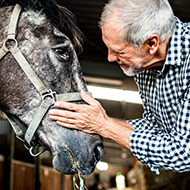Survey finds UK's senior horses in good condition

Regarding exercise, 62.8 per cent of horses were still in ridden work, but 72.9 of these were in light work, or slowing down.
In a survey on senior horses, it was revealed that 78 per cent of seniors in the UK were considered to be in good condition.
Highlighting a great sense of care for senior horses in the UK, SPILLERS undertook the survey to understand more about senior horse care and nutrition.
More than 12,000 horse owners completed the survey, and of these, 32.7 per cent had horses aged 25 years old or more. The results showed that 65.5 per cent of senior horse owners considered their horse to be classed as senior at 20 years old or higher.
Of the owners and carers surveyed, most reported that their horse was predominantly healthy and active, with 78 per cent in good condition, 10 per cent classified as overweight and 12 per cent classified as underweight.
In total, 25.8 per cent of seniors in the survey has no known clinical or health-related issues. Signs of stiffness or arthritis were reported in 44 per cent of the horses, while 15.2 per cent had Pars Pituitary Intermedia Dysfunction (PPID), and 15.2 per cent experienced dental issues.
Claire Dyett, from SPILLERS, commented on the results: Congratulations to all the owners and carers of senior horses as well as the equine industry as a whole for playing their part in helping our treasured senior horses and ponies grow old gracefully.
“It’s a real achievement that our seniors are ageing later and staying healthy and active in their older years. While almost a third are recorded as having PPID or dental issues, this is perhaps to be expected because horses are living longer.”
The survey also revealed UK owners' loyalty to their senior horses, with 58 per cent having owned their senior for over 11 years. Of those surveyed, 99.3 per cent of owners said that they intended to keep their horse for the rest of its life.



 The RCVS has announced a new version of its 1CPD mobile app, with enhanced features for veterinary surgeons and veterinary nurses to record their continuing professional development.
The RCVS has announced a new version of its 1CPD mobile app, with enhanced features for veterinary surgeons and veterinary nurses to record their continuing professional development.